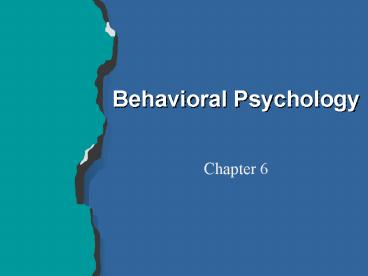Behavioral Psychology - PowerPoint PPT Presentation
1 / 19
Title:
Behavioral Psychology
Description:
Learning is the result of experience. Learning is not the result of maturation or ... States & capitals. Stimulus. Event that activates a behavior. Response ... – PowerPoint PPT presentation
Number of Views:3421
Avg rating:3.0/5.0
Title: Behavioral Psychology
1
Behavioral Psychology
- Chapter 6
2
Definition of Learning
- Relatively permanent change
- In behavior or knowledge
- Learning is the result of experience
- Learning is not the result of maturation or
temporary conditions (illness)
- Perspectives on LearningBehavioral Learning
must be observable change in
behaviorCognitive Learning is an internal
process and cannot be
observed directly
3
- Contiguity Learning
- Learning by simple associations or repeated
pairing - Examples
- Golden Arches Mc Donalds
- Times tables
- States capitals
- Stimulus
- Event that activates a behavior
- Response
- Observable reaction to stimulus
4
Classical Conditioning
Unconditioned Stimulus (food)
Unconditioned Response (saliva)
Neutral Stimulus (bell)
Unconditioned Response (Sali-
va)
Unconditioned Stimulus (food)
Repeated pairing US with NS
(food) (bell)
Conditioned Stimulus (bell)
Conditioned Response (saliva)
5
Pavlov Classical Conditioning
- Pavlovs dilemma
- Conditioned Stimulus--gtStimulus that evokes an
emotional or physiological response after
conditioned - Conditioned Response?learned response to a
previously neutral stimuli - Generalization--gt responding in the same way to
similar stimuli - Discrimination--gtresponding different to similar
but not identical stimuli - Extinction--gtgradual disappearance of a learned
response
6
Using Principles of Classical Conditioning in the
Classroom
- Associate positive, pleasant events with learning
tasks - Help students to risk anxiety-producing
situations voluntary and successfully - Help students recognize differences and
similarities among situations so they can
discriminate and generalize appropriately
7
Skinner Operant Conditioning
- Operants deliberate actions (goal directed)
- ABCs Antecedent Events? Behavior?Consequences
- (A--gtB--gtC)
- Reinforcement?the use of consequences to
strengthen behaviors - Reinforcers?events that follow behaviors and
strengthen them - Punishment?the use of consequences to weaken
behavior
8
Types of Reinforcement
- Positive reinforcement
- Examples
- Praise
- Teacher attention
- Rewards
- Immediate
- Exchangeable
- Negative reinforcement
- Behavior is produced in order to
- avoid the loss of privileges or to
- take away an aversive stimulus
9
Types of Punishment
- Presentation Punishment
- Detention
- Extra work
- Removal Punishment
- Loss of recess
- Loss of privileges
Reinforcement Schedules
- Continuous - reinforce after every
- appropriate response
- Intermittent - presenting a reinforcer after
- some but not all
responses
10
Antecedents
Stayed here
- Providing previous information about expected
behaviors - Signaling when a behavior should be emitted
- Cueing Lights off Be quiet!
- Prompting Verbal reminder after students do not
get quiet after lights were turned off.
Interventions Encouraging
Positive Behavior
Teacher attention Praise ignore
11
- Premack principle? more preferred activity serves
as a reinforcer for a less preferred activity - Shaping?reinforcing each small step of progress
- Successive
- Approximations?
- Small components
- that make up a
- complex behavior
- Task Analysis?
- A system of breaking down a task
- hierachically into basic skills into basic
- skills and subskills
R
R
R
12
Coping with Undesirable Behavior
- Negative reinforcement? No recess until
- Satiation ?I would like 1000 of those perfect
spit wads, please! - Reprimands? soft private
- Response cost?take away points/tokens earned
- Differential Reinforcement of Incompatible
Behaviors (DRI)?reinforce a desired behavior that
is incompatible with the undesired one - Social isolation? is also called contingent
observation removing the student from activity
that is being interrupted - Time out? removing the student from all
reinforcement - Punishment
- Restitutional Over Correction
- Positive Practice Overcorrection
13
Reaching Every Student Functional
Behavioral Assessment
- Students act out to
- Receive attention
- Escape from some unpleasant situation
- Get a desired activity or item
- Meet sensory or physiological needs
- Are bored
- In order to understand the behavior
- The teacher must use functional behavioral
assessment?procedures to obtain information - About antecedents, behaviors and consequences to
determine the reason of the misbehavior - Positive behavioral supports
- Are interventions
- Designed to replace problem behavior
- With new actions
- That serve the same purpose for the student
14
Behavioral Approaches to Teaching and Management
- Group Consequences?rewards or punishment given to
a class as a whole as result of their behavior - Good Behavior Game?class is divided into teams
e/team receives points or demerits as result of
their behavior - Contingency Contract?contract between the teacher
and the student specifying the contingencies for
the reinforcement - Token Reinforcements?tokens are earned as result
of desired behaviorthey can be exchanged for
privileges or items
15
Observational Learning
- Social Learning Theory? emphasizes learning
through the observation of others - Cognitive Theory? adds the persons values,
beliefs, self perception and expectations to
social learning theory - Enactive Learning?learning by doing
- Vicarious Learning?learning by observing
- Steps
- Attention?focusing
- Retention?remembering
- Reproduction?doing it
- Motivation and reinforcement?Yeah! I can do it,
let me do it again
16
Factors that Affect observational Learning
17
Observational Learning in Teaching
- Directing attention
- Use peers?class leaders
- Make sure that they see that positive behaviors
lead to reinforcers - Encourage already learned behaviors
- Strengthening / weakening inhibitions
- Teaching new behaviors
- Arousing emotions
18
Self Management
- Self management?the use of behavioral learning
principles to change their own behavior - Goal Setting?Set goals and make the goals public
- Note Standards and effect on performance
- Monitor and Evaluate Progress?Evaluate record
performance - Promote self-reinforcement
19
Cognitive Behavior ModificationA?T?ST?B?C
Antecedent
T H I N K
S T A L k
- Similar to self management
- Adds thinking and self-talk
- More cognitive than behavioral approach--gt change
ideas/cognitions/emotions - Antecedent Event--gtautomatic thought emotions
and feelings?behavior
Important to teach reflection instead of
impulsivity!!!

